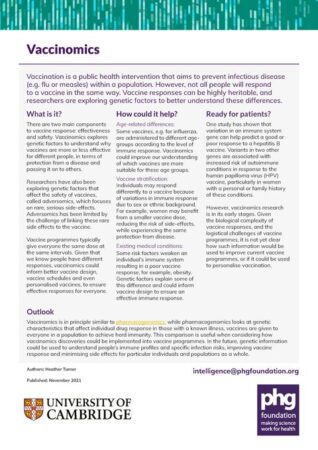Vaccination is a public health intervention that aims to prevent infectious disease (e.g. flu or measles) within a population. However, not all people will respond to a vaccine in the same way. Vaccine responses can be highly heritable, and researchers are exploring genetic factors to better understand these differences.
What is it?
There are two main components to vaccine response: effectiveness and safety. Vaccinomics explores genetic factors to understand why vaccines are more or less effective for different people, in terms of protection from a disease and passing it on to others.
Researchers have also been exploring genetic factors that affect the safety of vaccines, called adversomics, which focuses on rare, serious side-effects. Adversomics has been limited by the challenge of linking these rare side effects to the vaccine.
Vaccine programmes typically give everyone the same dose at the same intervals. Given that we know people have different responses, vaccinomics could inform better vaccine design, vaccine schedules and even personalised vaccines, to ensure effective responses for everyone.
How could it help?
Age-related differences:
Some vaccines, e.g. for influenza, are administered to different age-groups according to the level of immune response. Vaccinomics could improve our understanding of which vaccines are more suitable for these age groups.
Vaccine stratification:
Individuals may respond differently to a vaccine because of variations in immune response due to sex or ethnic background. For example, women may benefit from a smaller vaccine dose, reducing the risk of side-effects,
while experiencing the same protection from disease.
Existing medical conditions:
Some risk factors weaken an individual’s immune system resulting in a poor vaccine response, for example, obesity.
Genetic factors explain some of this difference and could inform vaccine design to ensure an effective immune response.
Ready for patients?
One study has shown that variation in an immune system gene can help predict a good or poor response to a hepatitis B
vaccine. Variants in two other genes are associated with increased risk of autoimmune conditions in response to the
human papilloma virus (HPV) vaccine, particularly in women with a personal or family history of these conditions.
However, vaccinomics research is in its early stages. Given the biological complexity of vaccine responses, and the logistical challenges of vaccine programmes, it is not yet clear how such information would be used to improve current vaccine programmes, or if it could be used to personalise vaccination.
Outlook
Vaccinomics is in principle similar to pharmacogenomics: while pharmacogenomics looks at genetic characteristics that affect individual drug response in those with a known illness, vaccines are given to everyone in a population to achieve herd immunity. This comparison is useful when considering how vaccinomics discoveries could be implemented into vaccine programmes. In the future, genetic information could be used to understand people’s immune profiles and specific infection risks, improving vaccine response and minimising side effects for particular individuals and populations as a whole.

